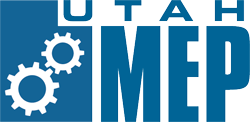ABOUT CLEAN MACHINE INC:
Clean Machine Inc. in Salt Lake City, UT, was formed in 1993 to provide complex machining services to the medical, semiconductor, aerospace and defense industries, along with other consumer product markets. Clean Machine customers have access to a 24-hour staff, state of the art equipment, and premium quality products. Clean Machine occupies 27,500 square feet of shop space. The “Clean Machine” name was chosen to reflect awareness to overall shop quality, organization and cleanliness. The company relies on a knowledgeable workforce and the latest technologies to meet critical machining demands.
Situation:
Clean Machine needed to become ISO (Internal Organization for Standardization) registered to the AS9100 Standard within a short period of time in order to satisfy one of its main customers in the aerospace business. Without the ISO registration, the aerospace sub-contract manufacturer indicated they would be forced by their customers to change suppliers and obtain precision machined parts from an AS9100 registered machine shop manufacturer elsewhere.
Solution:
Clean Machine enlisted the help of Utah MEP, a NIST MEP affiliate, to implement and prepare for registration to the AS9100 standard. The first step was to modify the current Quality Management System (QMS) based on ISO 9001:2008 to comply with the more technical aerospace standard AS 9100. The changes affected the current quality manual, quality policy, and four measurable quality objectives. From there Clean Machine was able to complete all the required processes necessary to comply with the AS9100 standard. The final step involved creating forms and policies, which was completed in half the time since the MEP Engineer had templates to help Clean Machine compile their own forms.
Clean Machine achieved its AS9100 registration with only a few minor findings during registration audits. MEP helped Clean Machine answer the audit findings and the company was able to keep its contract with the major aerospace client. Clean Machine expects to obtain additional aerospace business in the future and believes these registrations are critical to the company’s future viability and growth. Management has embraced the standard implementation and uses it to help grow and manage the company.
Results:
- Increased sales by $5M
- 6 new jobs created
- Cost savings of $210k
- $650k in new equipment investments



